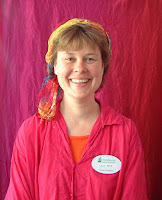Last time, Lizz's blog was only updated to February, but her March experiences have now been added.
Lizz's challenge for March was that everything she bought or ate should conform to LOAF criteria. LOAF is neither about bread nor about lounging around on the sofa! It refers to the Christian Ecology Link's food campaign.
It stands for: Local, Organically grown, Animal friendly, Fairly traded. You can find lots of further information on online for
LOCAL
ORGANIC
ANIMAL FRIENDLY
FAIR TRADE
LOAF as a campaign applies to food, but Lizz's challenge for March was to apply it to everything. It's really difficult to tick all four boxes at once - because most 'fair trade' goods are imported from developing countries so, by definition, they aren't local. And the 'fair trade' logo is rarely seen as applicable to locally produced goods. One of the issues identified immediately by Lizz was : 'what about books?' Many books sold under the label of UK publishers are in fact printed and produced in China - so, not local, then!
Lizz looks back and sees that she was much more consistently conscientious about all this when she had less disposable income. However, some people claim the opposite: consistently ethical buying is a luxury only affordable by the relatively well-off.
In her report on her March challenge, Lizz discusses clothes (made where?), shoes (to wear leather, or not?) and the question of charity shops, second-hand, and items given to her as gifts.
Then there's the question of furnishing and equipping a home - buying new? getting from Freecycle or Freegle? searching in skips? fair trade shops?
At the start of the month, looking around the area where she lives, Lizz discovered that:
The Co-op has some organic and fairtrade stuff, and a few vegan things, the Spar has soya milk and sometimes has a shelf with things sourced locally, the Tesco Metro up the road has almost nothing vegan (apart from fruit and veg), or organic, or specifically local or fair trade – apart from some tea and coffee. The greengrocers has veg though hardly any of it is organic and the nearby deli which I can pass on the walk to/from work with a little detour has lots of excellent eco, organic, local, animal friendly, and fair trade stuff too, though it’s expensive.So, some of the country-wide chains have suitable produce (the Co-op is probably the best), but local independent shops might be your best bet - but, as Lizz says, may be relatively expensive.
Lizz also touches on how you stick with your principles when you're abroad - in her case Amsterdam, for work - and you might not have all the local information.
At the end of her month, Lizz concludes
if you continue to pay attention LOAF living isn’t so hard! It does mean there are some things you can’t or wont do but that’s ok! No Primark cheapies, that’s obvious but if you go for local and animal friendly and don’t worry about organic then you can go for value ranges. Some fair trade foods are a good deal – the Co-op is an excellent source of fairtrade staplef oods like tea, chocolate and rice.You can read the whole of Lizz's March post on her blog.
Related to all this, there's a book I've just been looking at (ordered for the Woodbrooke Library, and just arrived). It's by Prashant Vaze and it's called The Economical Environmentalist: my attempt to live a low-carbon life and what it cost - published last year by Earthscan. You can read a review of the book on the website of the Financial Times. Linked to the book is an interactive website to help you cut your own carbon emissions.
* * * * *
If you want to post a comment, and are having technical difficulties, you can email your comment to me at Good.Lives@woodbrooke.org.uk and I can post it for you.If you are reader from outside the UK, please remember to post your comment in English - I won't post anything if I don't know what it says!
* * * *



No comments:
Post a Comment